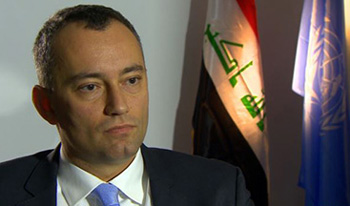Mojahedin Khalq will be expelled soon

RFE/RL: The parliamentary election on April 30 was the first since U.S. troops left Iraq a little over two years ago. How smoothly did the election go, in your opinion?
Nikolay Mladenov: This was the first entirely Iraqi-owned process in which the United Nations had an advisory role but the leading role was with the Iraqi authorities. And they deserve a lot of credit for a very professional manner in which they approached the organization of the election.”
RFE/RL: The election took place against a backdrop of rising violence in Iraq, which is in the midst of its worst unrest since the country came near to civil war in 2008. At the same time, security forces are actively fighting insurgents in two key cities of Anbar province — Fallujah and the outskirts of Ramadi. Did the security situation have much impact on the election?
Mladenov: The security situation in Iraq is very difficult and inevitably this places a burden on the voting process and on the country at large. Therefore, the fact that 60 percent of people did come out to vote is even more remarkable. The legitimacy of the vote, the acceptance of the results — we will see how the public will react to that once the results are finalized.
RFE/RL: Do you think the election will help Iraq address some of its biggest internal political problems? For example, the disputed border of the autonomous Kurdish region, a dispute which is causing tension between different communities in the north of Iraq, including the Kurds, Turkomans, and Arabs?
Mladenov: I am hopeful that, once the new parliament convenes and the new government is formed, we will — with the cooperation of the federal government in Baghdad and the regional government in Irbil — be able to get back to…resolving the disputed internal boundaries.”
RFE/RL: When we look at Iraq’s conflicts, they often seem to be along sectarian and religious lines. Are you optimistic that Iraq will be able to overcome these divides, partly through democratic processes like this recent election?
Mladenov: Iraqis have for many years been one of the societies in the region that has seen the highest number of intermarriages between faiths and ethnic groups. The people of this country are tired of sectarian divisions and are tired of being labeled in different ways.
RFE/RL: Finally, on a slightly different subject, the UN is involved in the difficult task of trying to resolve the fate of the remaining members of the Iranian opposition group — the Mujahedin-e Khalq — who are still interned at Camp Ashraf and Camp Liberty in Iraq as they await countries to take them as refugees. What are the prospects for finishing this process and closing the camps?
Mladenov: The UN has appointed a special representative to seek relocation opportunities for this group. We are working closely with our American friends and partners who also are looking to such opportunities. It is not an easy process but it is a very important process to find a way for these people to leave the country and to continue their lives in other parts of the world.



